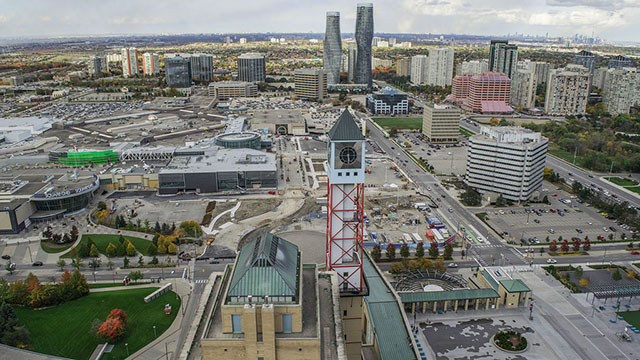Property taxes set to rise in Mississauga, councillors agree to a salary freeze
Published February 25, 2021 at 4:51 pm

Homeowners in Mississauga can expect to see a small increase in their property tax bill following the official approval of Mississauga’s 2021-2024 Business Plan and 2021 Budget.
On Feb. 24, council passed a budget that includes an overall residential property tax increase of 2.1 per cent. One per cent of the increase is from Mississauga’s portion and 1.1 per cent is from the Region of Peel’s portion.
The city says that residents who own properties valued at $730,000 (or $7.71 per $100,000 of assessment) can expect to see a $56 increase on the city’s portion of the property tax.
Property taxes in Mississauga are used to fund services provided by the city, the Region of Peel and the province for the Ministry of Education. Of every property tax dollar, 36 per cent goes to the city; the rest is divided between the Region of Peel at 45 per cent and the province at 19 per cent.
The city says the 2021 operating budget invests in the following services and facilities:
- Completion of the new Churchill Meadows Community Centre
- Continued MiWay investment with new hybrid electric buses
- Implementing the Transportation Master Plan, progressing toward the Vision Zero road safety initiative
- 1 Port Street Environmental Assessment
- Continued construction of new fire stations
- A $7.6 million in savings through MiWay due to the cancellation of two express services and the transition to Kipling Bus Terminal
- Development of the city’s first Pedestrian Master Plan
- Continued investments in new technology
- Implementation of the city’s first Climate Change Action Plan (CCAP) to mitigate greenhouse gases
“Together our council members approved a fair and equitable budget that allows us to keep taxes low while continuing to respond to the pandemic. Staff worked incredibly hard to bring forward a balanced budget that still delivers the essential city services that residents need and expect, including transit, library, and fire and emergency services, despite revenue losses,” said Mayor Bonnie Crombie in a statement.
“We have been strong and resilient as a city through the pandemic and will continue to deliver value for money for residents while making the strategic investments that are needed to move us forward and stay competitive.”
As part of the capital budget, the city says it will invest in the following:
- Environmental Assessment Studies for Bus Rapid Transit corridors on Dundas Street and Lakeshore Road
- Renovations at the Burnhamthorpe Community Centre
- Renovations and repairs to the Meadowvale Theatre and the Living Arts Centre
- Planned lifecycle replacements from 2021 to 2023 city-wide, some of which include 40 kilometres of trail reconstructions, 14 playground redevelopment and 17 sport field and court maintenance and replacements
- Nine pedestrian bridge replacements
- Redevelopment of the Central Library, adding 34,000 square feet, a new children’s space, and enhanced supports for people experiencing homelessness
The city says the roads service area received the largest portion of the city’s capital budget allocation with $89.1 million (or 33 per cent) requested for 2021. Projects include improvements to cycling infrastructure, bridge and culvert renewal, roadway rehabilitation and investment in the West Credit site.
Council also approved a one-third reduction of the car allowance allotted for councillors.
Council also agreed to freeze councillors’ salaries for 2021.
The city says the 2021 budget, first introduced in 2020, considered financial recovery strategies to offset pandemic-related budget pressures. These included a return to normal fee schedule and collection as soon as possible, no new material service level changes in 2021, a reduction in discretionary spending, a critical assessment of capital expenditures, use of reserves, continued collaboration with other municipalities to seek assistance from higher levels of government and an increase in user fees.
According to the city’s budget document, the second lockdown (which will remain in place until at least March 8 with the possibility of extension) worsened the city’s financial outlook and could result in a $50-$60 million shortfall.
While the document says that Safe Restart funding from higher levels of government will help by providing $58 million in transit funding and $15 million in municipal funding, it will only offset pressure until March 31, 2021.
“COVID-19 presented new challenges that our staff quickly rose and adapted to while honouring our commitment to service excellence, fiscal responsibility and continuous improvement,” said Paul Mitcham, City Manager and Chief Administrative Officer (CAO), in a statement.
“Early on, with council direction, the city took actions to mitigate the financial impact such as temporary staff layoffs, a hiring freeze, discretionary spending review and deferral of some 2020 capital projects. We greatly appreciate the funds allocated by the federal and provincial governments through the Safe Restart Agreement (phase I and II spread over 2020 and 2021). I am proud of our staff that worked diligently with council throughout the pandemic to deliver a solid budget that will help us through recovery and to move forward and prepare for the years to come.”
The Stormwater Charge, which appears on the Region of Peel water bill, will increase by 2 per cent in 2021. This means the average residence will see an increase of $2.20 or less.
Cover photo courtesy of @idris.yyz
insauga's Editorial Standards and Policies advertising





